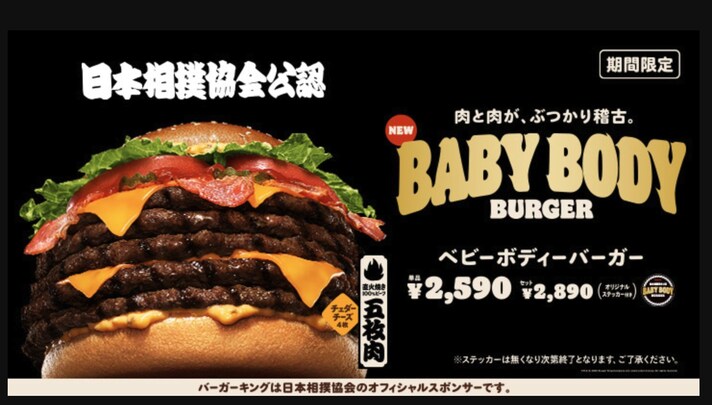
In Japan, a land of dietary rigor, minimalist sushi, and portions that seem drawn with a compass, Burger King has decided to make a bold entry with something that's anything but subtle: the "Sumo burger," a high-calorie sandwich designed—at least on paper—to satisfy the appetite of a professional wrestler. But while the name nods to tradition, the contents are more of a stomach-churning treat: multi-layered meat, endless cheese, bacon, fried onions, and a mysterious sauce that seems to say "surrender."
A marketing ploy that blends Japanese folklore and American appetites, raising more than one question. Not just nutritionally, but also culturally: do we really need a 1,500-calorie sandwich to celebrate local gastronomic identity?
Sumo as a Pretext? What's The Burger King Sandwich Like?
The burger is officially called the Baby Body Burger, a curious name intended to (ironically) recall the imposing physiques of sumo wrestlers. It was created in collaboration with the Japan Sumo Association as a tribute to the summer tournament and will be available only for a limited time at Burger King stores in Japan. The recipe is a monument to the concept of "too much": five grilled beef patties, four slices of cheddar, bacon, tomato, lettuce, pickles in white wine, and a generous splash of sauces (aurora, mayo, ketchup, and mustard) that try to hold it all together—if only out of solidarity. It's all wrapped up in an extra-large seeded bun, so stuffed it requires two hands, a contingency plan, and maybe even a fork. The calories? Approximately those of a full meal… for two.
Burger King presents it as a "muscular" homage to sumo, but one wonders if it's more of a tribute to junk food elevated to performance. A choice that stands in stark contrast to Japanese gastronomic sobriety, which rarely indulges in such overt excesses. Especially in a country where obesity is monitored by law and where balance —on the plate and in life—is still considered a virtue.

The reference to sumo is strategic, but also a bit sly. In Japan, the figure of the wrestler is almost mythological: strength, discipline, ritual. But the association between "sumo" and "eating like there's no tomorrow" is an all-too-convenient Western simplification. Sumo wrestlers follow rigorous diets (often based on protein-rich stews, such as chanko-nabe) and rigorous training. The idea that a fast-food sandwich is enough to "feed a champion" is more marketing than reality.
Yet Burger King is no stranger to these theatrical moves. It has previously launched "localized" burgers for specific markets: just think of the "Kuro Burger" (with charcoal-infused black bread and cheese) in Japan, or the kimchi Whoppers in Korea. This approach mirrors that of its historic rival McDonald's, which has always been a master at adapting its menu to local customs: the McPaneer in India, the McFalafel in the Middle East, and the Teriyaki Burger in Japan itself.
Heavy Marketing, Difficult Digestion
The problem, of course, isn't that a gigantic sandwich exists. The problem is the message it conveys: the idea that overeating is something to be celebrated, almost imitated. A paradox, considering that Japan has strict regulations to combat obesity, including the infamous "metabo law," which requires regular waist measurement checks for those over 40 (with fines for companies whose employees exceed the limit).
Sure, you might say it's just a publicity stunt, a sandwich destined to remain on shelves for a few weeks. But the "it's all good" culture —especially when it comes to food—is never entirely harmless. And if even in the land of sushi and the finest umami, people are seduced by American super-sizing, perhaps it's worth raising the conversation.
The "Sumo Burger" isn't just a sandwich: it's a symbol: of a marketing strategy that confuses "local" with "folkloric," of a diet that's too often measured in kilos rather than quality. It's ironic that in a country where respect for balance is a fundamental value—from design to food—we have to witness the glorification of the XXL sandwich.
Of course, you don't have to buy it. But it's hard to ignore the message it conveys: eat like a fighter, even if you live like an office worker. And you'll think about the consequences later.
;Resize,width=767;)
